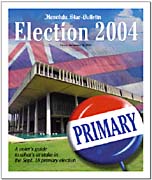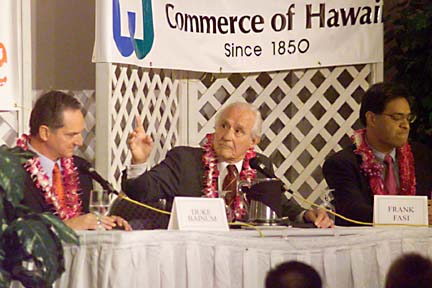

[ HONOLULU MAYOR ]
Mayor’s race tops
primary ticket
Bainum, Hannemann and Fasi
each hope to win the seat outright
The race for Honolulu mayor heads the list of big contests for the 2004 primary election, to be held Sept. 18.
The mayor's race, featuring former City Councilmen Duke Bainum and Mufi Hannemann and former Mayor Frank Fasi, could be wrapped up this month if one of the candidates gets more than 50 percent of the vote. If no candidate gets 50 percent, the top two candidates go on to fight it out in the Nov. 2 general election.
First-term Big Island Mayor Harry Kim has the only other mayor's race in the state. Kim faces a primary fight against four challengers: Roger Christie, Joe Fernandez, Kelly Greenwell and Dominic Yagong.
On a federal level, the contested primary elections put challengers in the difficult position of battling each other to get to a general election fight against a well-known Democratic incumbent.
For instance, four Republicans -- Cam Cavasso, James DeLuze, Jay Friedheim and Rich Payne -- are challenging Sen. Daniel K. Inouye, who has been in Washington since statehood and regularly wins re-election with 70 percent or more of the vote.

|
In the race for the rural Oahu and neighbor island 2nd Congressional District, Democratic freshman incumbent Rep. Ed Case is expected to face the winner of a four-way primary GOP contest between City Councilman Mike Gabbard, Dr. Inam Rahman, Miles Shiratori and Jonathan Treat.
Two of the more heated races are for state Senate seats, as incumbent Democrats Sen. Cal Kawamoto (Waipahu) and Melodie Aduja (Kahuku-Kaneohe) face, respectively, challengers Clarence Nishihara, a retired educator, and Clayton Hee, a former state legislator and Office of Hawaiian Affairs trustee.
The Aduja-Hee race is being closely watched by Senate leaders because Senate President Robert Bunda, who is running unopposed, is strongly backing Aduja. In return, Aduja is expected to support Bunda when the Senate organizes after the November general election.
After the primary, local politics will heat up considerably as Democratic and Republican legislative candidates press their campaigns for control of the Legislature.

|
Republican Gov. Linda Lingle has made gaining a majority in the state House her top political objective of 2004. The state GOP is backing Lingle in that effort with a series of 15 Oahu rallies to support candidates, and is also promising to help with advertising and direct-mail help for all the GOP candidates.
On the Democratic side, House Speaker Calvin Say has organized a political action committee devoted to preserving the Democratic majority in the House and has raised more than $200,000 to support Democrats in the general election contests.
Democrats now have a 36-to-15 majority in the House and a 20-to-5 dominance in the Senate. Republicans need to gain three more seats to block an override of a Lingle veto and pick up 11 more seats to win the House majority.
starbulletin.com/2004/09/10/special/index.html
www.state.hi.us/elections/

|
Past shapes present
in mayoral race
Both Hannemann and Bainum have attacked
voting records and positions on the issues
The political battle over who will be the next Honolulu mayor could come down to who can make the other candidate look worse.
Leading candidates Mufi Hannemann and Duke Bainum have gone after each other's City Council record, campaign spending practices and positions on issues such as transportation to point out their differences and the reasons why voters should elect them.
Former Mayor Frank Fasi, who along with seven other candidates are also running, wants another crack at leading the city.
The election for mayor is a nonpartisan contest that could result in a winner on primary election night. That's because if a candidate receives 50 percent plus one vote, that candidate wins.
If not, the top two vote getters move onto the general election.
Bainum, a physician, was a neighborhood board member, state representative and a member of the City Council. He is campaigning on a theme of "Honest Change," promising ethical reform at City Hall if elected and to break what he says is the link between illegal campaign donations and government contracts.
Hannemann's best known stints have been as C. Brewer vice president, state Department of Business, Economic Development and Tourism director, City Council member and chairman.
He resigned to run unsuccessfully for mayor four years ago against Mayor Jeremy Harris.
Hannemann is campaigning on a platform of issues including fiscal accountability, basic city services and revitalizing the economy.
Hannemann has won the support of the public sector labor unions representing white-and blue-collar workers, police and firefighters. Bainum has received backing from private sector labor organizations representing hotel and restaurant workers, carpenters and electricians.
The two candidates actually have similar positions on some issues including the promise to concentrate on basic city services such as upkeep of roads and sewers.
Even though Bainum was originally a backer of the controversial Bus Rapid Transit, he and Hannemann agree on rail transit as a long-term fix to Oahu's traffic woes.
The mayor's race also includes candidates Daniel Cunningham, Theodore Gibson, Lillian Hong, Paul Manner, Glenn Pinho, Mike Powers and Terrence Teruya.
starbulletin.com/2004/09/10/special/index.html
www.state.hi.us/elections/